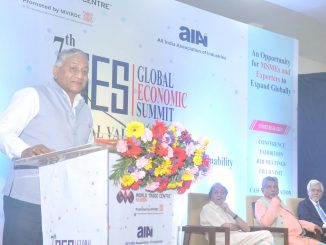
Q1. What’s your take on the future of India’s SME sector?
Amidst these tough times ushered in by the ongoing Covid-19 pandemic, the Indian SME sector is expected to continue to emerge as a catalyst for the Indian Economy. With India aiming for a $5 trillion economy by 2024, the Centre envisions a contribution of $2 trillion and generation of five crore additional jobs from MSMEs by 2024. The sector’s contribution to the GDP and Indian exports is also expected to increase to 50 per cent of GDP from the existing 30 per cent and 48 per cent of total exports to 60 per cent in the coming future. With the easing of the eligibility criteria of BSE SME Listing and the cutting down of annual listing fees, few more MSMEs are expected to be attracted to choose the listing path for aiding their capital requirements.
Q2. According to you how can the various players from the SME sector arrange sufficient funds to meet their capital requirements?
The reluctance of the banking sector to lend to MSMEs due to due to their higher risk profile owing to zero collateral or their limited years of operations has remained the key hurdle for SME Financing. Even during Covid times, the Government has taken proactive measures to guarantee better access to credit to MSMEs, including the proposal to set up an INR 10000 crore fund to make risk capital investment in start-ups and SMEs and cuts in excise duty on capital goods. Still the SME financing demand and supply gap has remained consistent. Few steps which may help the SME Players to narrow down the aforesaid gap and expedite the funding process could be as follows:
- Good CIBIL Score
- Proper documentation with respect to presence of business and operations
- Clearly defined business projection backed by realistic and justifiable business plan.
- Zero percent noncompliance in tax and regulatory reporting and compliance requirement
Q3. As per your views, how important is it for the various SME owners to invest in the development of their employees & workforce?
In order to continue to emerge as an employment generator and engine for India’s economic growth, SME owner’s attention towards learning and development is critical. Governmental reforms have contributed towards the generation of a growth-friendly environment for SMEs, the individual growth of each enterprise depends on their ability to keep in touch with industrial advances and ensure that the right skilled workforce is available, making learning and development practices a must for this industry. Owing to budget constraints, smart learning platforms that allow creation of courses, assessments, certification, gamification, and detailed analytics of trainings at the learner level, can help MSMEs in maximising their training effectiveness.
Q4: What are your views on all the speculations surrounding the ban of Crypto Currency in India?
There may not be a blanket ban, the Govt will likely eventually promote an official currency or permit well-regulated currencies from the global market. This is likely to be complemented by a formal regulation around taxation from gains / losses from dealing with Crypto Currency or Tokens.
Q5. What structural changes can lead the various SMEs in India towards achieving increased & efficient productivity?
Just like any other scale of business and operations, SMEs should direct their efforts and focus on optimising quality, productivity through cleaner methods, workforce management and cooperation, and operational safety and health. Digitisation and automation across supply and production chain, innovative funding, strategic partnerships, cost effective equipment leasing solutions, customisable learning and development platforms can act as catalysts for improved efficiency and productivity of the SMEs.
Q6. What steps can further be taken by the Government for the development of India’s SME sector?
Driven by the objective of improving the ease of doing business and realising the importance of the sector, the government has been pushing for several reforms and initiatives in this sector. A lot is done but more needs to be undertaken for SMEs to boost their financial availability, liquidity and skill development. The Centre’s initiatives like Technology Centre Systems Programme, Entrepreneurship Skill Development Programme etc. need to be further boosted to help the young entrepreneur procure prerequisite skills and get familiarised with modern technologies and operations.
Also, a close monitoring of the existing credit facility by the designated central and state authorities is the need of the hour to ensure that idle funds lying with the bank under different schemes and initiatives can be utilised as a part of measures to boost the stressed SME’s. Further learned by the experiences in Covid-19, initiatives shall be undertaken

to facilitate wage subsidy and enterprise security in SME Sector.
Shri Suraj Malik is a Partner, Tax and Regulatory Services at BDO India, the India member firm of BDO International, a globalnetwork of independent firms specialising in full service, assurance, accounting, tax & advisory. He is an industry expert with vast experience in deals and fund structuring, inbound and outbound investments, M&A transactions, corporate and business restructuring, family offices, private equity and Corporate laws & Exchange Control Regulations.






